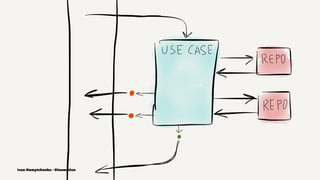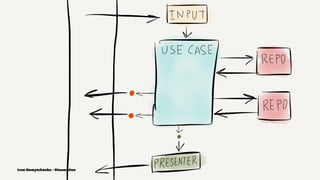From Rails-way to modular architecture
- 1. From Rails-way to modular architecture Ivan Nemytchenko ¡ª @inemation Ivan Nemytchenko - @inemation
- 2. Me: ? Came to Rails from PHP (long time ago) ? co-founded two agencies ? co-organized two conferneces ? did a lot of management stuff ? currently freelancer Ivan Nemytchenko - @inemation
- 3. Idea + RailsRumble ¡ı tequila gem (HAML for JSON) Ivan Nemytchenko - @inemation
- 4. tequila gem ¡ı inspiration for @nesquena ¡ı gem RABL Ivan Nemytchenko - @inemation
- 5. Rails is awesome, isn't it? Ivan Nemytchenko - @inemation
- 6. Same pattern Ivan Nemytchenko - @inemation
- 7. Ivan Nemytchenko - @inemation
- 8. Ivan Nemytchenko - @inemation
- 9. Ivan Nemytchenko - @inemation
- 10. Ivan Nemytchenko - @inemation
- 11. 1. Knowing how to do it in a Rails-way is not enough. Ivan Nemytchenko - @inemation
- 12. These things might help you ? SOLID principles ? Design Pattrens ? Refactoring techniques ? Architecture types ? Code smells identi?cation ? Tesing best practices Ivan Nemytchenko - @inemation
- 13. 2. Knowing about something doesn't mean you know how to apply it Ivan Nemytchenko - @inemation
- 14. The story Ivan Nemytchenko - @inemation
- 15. Client Ivan Nemytchenko - @inemation
- 16. Ivan Nemytchenko - @inemation
- 17. Ivan Nemytchenko - @inemation
- 18. Problem: ? Current team stuck Ivan Nemytchenko - @inemation
- 19. Problem: ? Current team stuck Project: ? Monolythic Grails app ? Mysql database of ~70 tables Ivan Nemytchenko - @inemation
- 20. Solution ? Split frontend and backend ? AngularJS for frontend ? Rails for API Ivan Nemytchenko - @inemation
- 21. Solution ? Split frontend and backend ? AngularJS for frontend ? Rails for API ? Keeping DB structure Ivan Nemytchenko - @inemation
- 22. Ok, lets do it! Ivan Nemytchenko - @inemation
- 23. Accessing data (AR models) class Profile < ActiveRecord::Base self.table_name = 'profile' belongs_to :image, foreign_key: :picture_id end Ivan Nemytchenko - @inemation
- 24. Accessing data (AR models) class Image < ActiveRecord::Base self.table_name = 'image' has_and_belongs_to_many :image_variants, join_table: "image_image", class_name: "Image", association_foreign_key: :image_images_id belongs_to :settings, foreign_key: :settings_id, class_name: 'ImageSettings' belongs_to :asset end Ivan Nemytchenko - @inemation
- 25. Presenting data (RABL) collection @object attribute :id, :deleted, :username, :age node :gender do |object| object.gender.to_s end node :thumbnail_image_url do |obj| obj.thumbnail_image.asset.url end node :standard_image_url do |obj| obj.standard_image.asset.url end Ivan Nemytchenko - @inemation
- 26. Let's implement some features! Feature #1: Users Registration Ivan Nemytchenko - @inemation
- 27. Let's implement some features! Feature #1: Users Registration Ivan Nemytchenko - @inemation
- 28. Conditional validations? Anyone? Ivan Nemytchenko - @inemation
- 29. Our model knows about.. ? How user data is saved ? How admin form is validated ? How org_user form is validated ? How guest_user form is validated Ivan Nemytchenko - @inemation
- 30. Singe responsibility principle: A class should have only one reason to change Ivan Nemytchenko - @inemation
- 31. Form object (Input) class Input include Virtus.model include ActiveModel::Validations end class OrgUserInput < Input attribute :login, String attribute :password, String attribute :password_confirmation, String attribute :organization_id, Integer validates_presence_of :login, :password, :password_confirmation validates_numericality_of :organization_id end Ivan Nemytchenko - @inemation
- 32. Using form object (Input) input = OrgUserInput.new(params) if input.valid? @user = User.create(input.to_hash) else #... end Ivan Nemytchenko - @inemation
- 33. Form objects Pro: We have 4 simple objects instead of one complex. Con: You might have problems in case of nested forms. Ivan Nemytchenko - @inemation
- 34. Let's implement more features! Feature #2: Bonuscode redeem Ivan Nemytchenko - @inemation
- 35. Ivan Nemytchenko - @inemation
- 36. Ivan Nemytchenko - @inemation
- 37. def redeem unless bonuscode = Bonuscode.find_by_hash(params[:code]) render json: {error: 'Bonuscode not found'}, status: 404 and return end if bonuscode.used? render json: {error: 'Bonuscode is already used'}, status: 404 and return end unless recipient = User.find_by_id(params[:receptor_id]) render json: {error: 'Recipient not found'}, status: 404 and return end ActiveRecord::Base.transaction do amount = bonuscode.mark_as_used!(params[:receptor_id]) recipient.increase_balance!(amount) if recipient.save && bonuscode.save render json: {balance: recipient.balance}, status: 200 else render json: {error: 'Error during transaction'}, status: 500 end end end Ivan Nemytchenko - @inemation
- 38. Ivan Nemytchenko - @inemation
- 40. Service/Use case: class RedeemBonuscode def run!(hashcode, recipient_id) raise BonuscodeNotFound.new unless bonuscode = find_bonuscode(hashcode) raise RecipientNotFound.new unless recipient = find_recipient(recipient_id) raise BonuscodeIsAlreadyUsed.new if bonuscode.used? ActiveRecord::Base.transaction do amount = bonuscode.redeem!(recipient_id) recipient.increase_balance!(amount) recipient.save! && bonuscode.save! end recipient.balance end end Ivan Nemytchenko - @inemation
- 41. Using service: def redeem use_case = RedeemBonuscode.new begin recipient_balance = use_case.run!(params[:code], params[:receptor_id]) rescue BonuscodeNotFound, BonuscodeIsAlreadyUsed, RecipientNotFound => ex render json: {error: ex.message}, status: 404 and return rescue TransactionError => ex render json: {error: ex.message}, status: 500 and return end render json: {balance: recipient_balance} end Ivan Nemytchenko - @inemation
- 42. Services/Use case Pro: not mixing responsobilities Pro: not depending on ActionController Con: using exceptions for Flow Control is slow Ivan Nemytchenko - @inemation
- 43. Whole picture: before Ivan Nemytchenko - @inemation
- 44. Whole picture: after Ivan Nemytchenko - @inemation
- 45. Are we happy now? Ivan Nemytchenko - @inemation
- 46. Not really happy if image = profile.image images = [image] + image.image_variants original = images.select do |img| img.settings.label == 'Profile' end.first resized = images.select do |img| img.settings.label == 'thumbnail' end.first end Ivan Nemytchenko - @inemation
- 47. Domain-specific objects ? User ? Pro?le ? Image ? ImageVariant ? ImageSettings Ivan Nemytchenko - @inemation
- 48. Domain-specific objects ? User ? Pro?le ? Image ? ImageVariant ? ImageSettings Ivan Nemytchenko - @inemation
- 49. Domain-specific objects ? User ? Pro?le ? Image ? ImageVariant ? ImageSettings Ivan Nemytchenko - @inemation
- 50. Repositories + Entities Ivan Nemytchenko - @inemation
- 51. Entities class Entity include Virtus.model def new_record? !id end end class User < Entity attribute :id, Integer attribute :username, String attribute :profiles, Array[Profile] attribute :roles, Array end Ivan Nemytchenko - @inemation
- 52. Repositories Ivan Nemytchenko - @inemation
- 53. Repositories def find(id) if dataset = table.select(:id, :username, :enabled, :date_created, :last_updated).where(id: id) user = User.new(dataset.first) user.roles = get_roles(id) user end end Ivan Nemytchenko - @inemation
- 54. Repositories def find(id) dataset = table.join(:profile_status, id: :profile_status_id) .join(:gender, id: :profile__gender_id) .select_all(:profile).select_append(*extra_fields) .where(profile__id: id) dataset.all.map do |record| Profile.new(record) end end Ivan Nemytchenko - @inemation
- 55. Ivan Nemytchenko - @inemation
- 56. Ivan Nemytchenko - @inemation
- 57. Repositories/Entities Con: There's no AR magic anymore Con: Had to write a lot of low-level code Pro: You have control on what's happening Pro: Messy DB structure doesn't affect app Pro: DDD!? Ivan Nemytchenko - @inemation
- 58. Side effect RABL Ivan Nemytchenko - @inemation
- 59. Presenters module ProfilePresenter def self.wrap_one!(obj, viewer) hash = obj.to_hash hash.delete(:secret_field) unless viewer.admin? hash end end Ivan Nemytchenko - @inemation
- 60. Presenters def show profile = ProfileRepository.find(params[:id]) hash = ProfilePresenter.wrap_one!(profile, current_user) render json: {profile: hash} end Ivan Nemytchenko - @inemation
- 61. Ivan Nemytchenko - @inemation
- 62. Ivan Nemytchenko - @inemation
- 63. Not depending on Rails anymore! Ivan Nemytchenko - @inemation
- 64. Sequel Virtus Ivan Nemytchenko - @inemation
- 65. Rom.rb Lotus Ivan Nemytchenko - @inemation
- 66. Arkency blog.arkency.com Adam Hawkins hawkins.io Ivan Nemytchenko - @inemation
- 67. Ivan Nemytchenko - @inemation




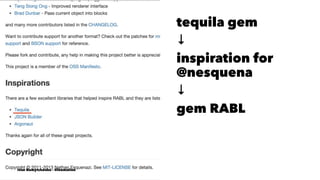







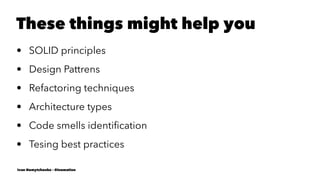





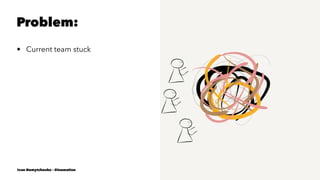
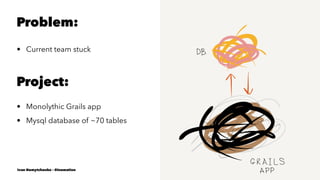
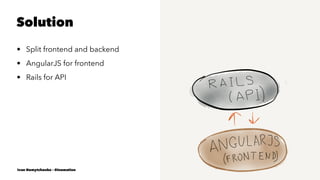
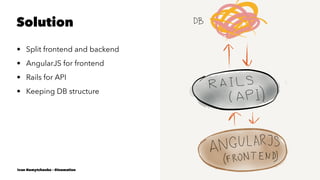

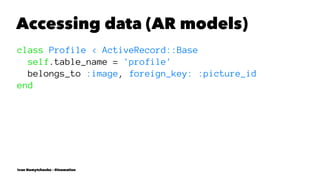
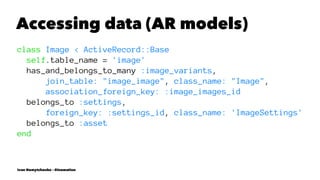
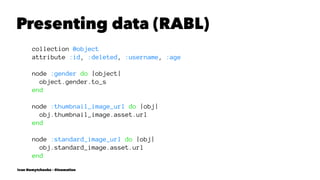

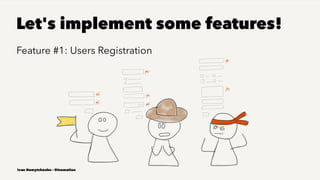

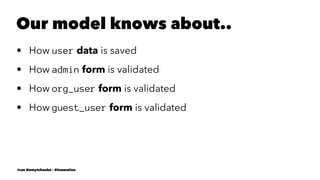

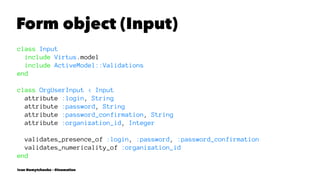
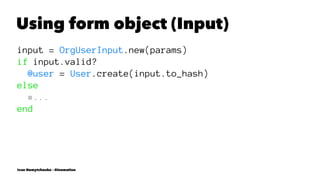
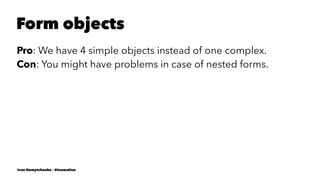

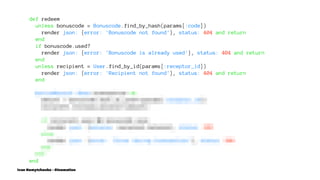
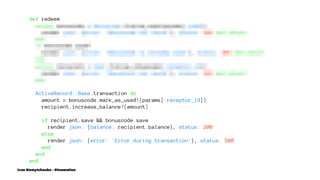
![def redeem
unless bonuscode = Bonuscode.find_by_hash(params[:code])
render json: {error: 'Bonuscode not found'}, status: 404 and return
end
if bonuscode.used?
render json: {error: 'Bonuscode is already used'}, status: 404 and return
end
unless recipient = User.find_by_id(params[:receptor_id])
render json: {error: 'Recipient not found'}, status: 404 and return
end
ActiveRecord::Base.transaction do
amount = bonuscode.mark_as_used!(params[:receptor_id])
recipient.increase_balance!(amount)
if recipient.save && bonuscode.save
render json: {balance: recipient.balance}, status: 200
else
render json: {error: 'Error during transaction'}, status: 500
end
end
end
Ivan Nemytchenko - @inemation](https://image.slidesharecdn.com/slides2-150315061053-conversion-gate01/85/From-Rails-way-to-modular-architecture-37-320.jpg)
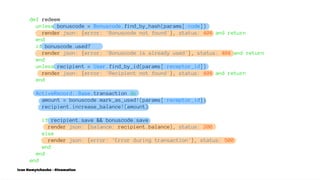

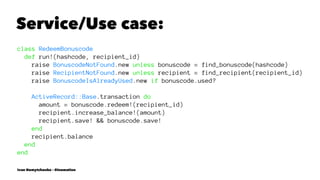
![Using service:
def redeem
use_case = RedeemBonuscode.new
begin
recipient_balance = use_case.run!(params[:code], params[:receptor_id])
rescue BonuscodeNotFound, BonuscodeIsAlreadyUsed, RecipientNotFound => ex
render json: {error: ex.message}, status: 404 and return
rescue TransactionError => ex
render json: {error: ex.message}, status: 500 and return
end
render json: {balance: recipient_balance}
end
Ivan Nemytchenko - @inemation](https://image.slidesharecdn.com/slides2-150315061053-conversion-gate01/85/From-Rails-way-to-modular-architecture-41-320.jpg)
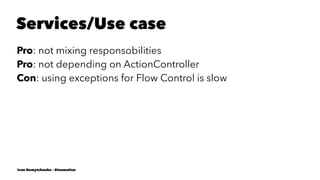
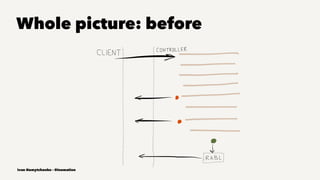
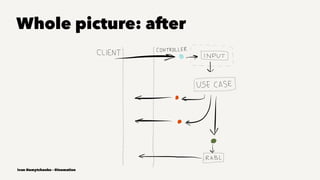

![Not really happy
if image = profile.image
images = [image] + image.image_variants
original = images.select do |img|
img.settings.label == 'Profile'
end.first
resized = images.select do |img|
img.settings.label == 'thumbnail'
end.first
end
Ivan Nemytchenko - @inemation](https://image.slidesharecdn.com/slides2-150315061053-conversion-gate01/85/From-Rails-way-to-modular-architecture-46-320.jpg)
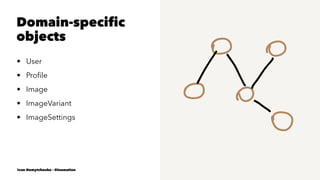
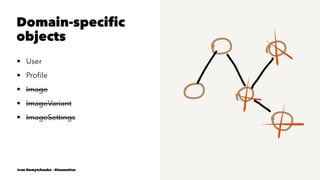
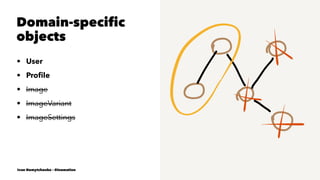
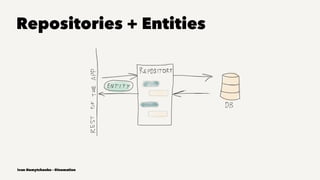
![Entities
class Entity
include Virtus.model
def new_record?
!id
end
end
class User < Entity
attribute :id, Integer
attribute :username, String
attribute :profiles, Array[Profile]
attribute :roles, Array
end
Ivan Nemytchenko - @inemation](https://image.slidesharecdn.com/slides2-150315061053-conversion-gate01/85/From-Rails-way-to-modular-architecture-51-320.jpg)

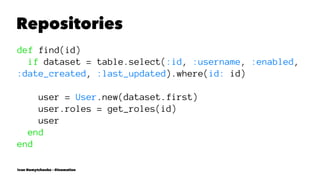
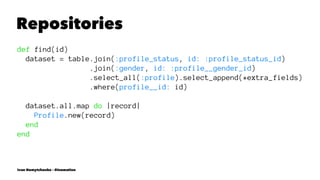
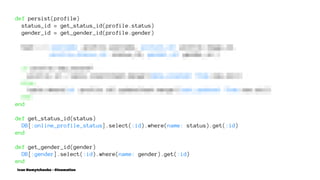
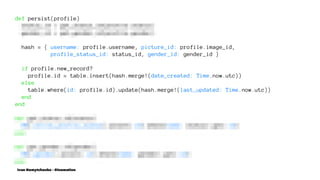
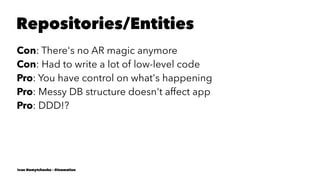

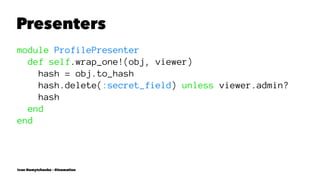
![Presenters
def show
profile = ProfileRepository.find(params[:id])
hash = ProfilePresenter.wrap_one!(profile, current_user)
render json: {profile: hash}
end
Ivan Nemytchenko - @inemation](https://image.slidesharecdn.com/slides2-150315061053-conversion-gate01/85/From-Rails-way-to-modular-architecture-60-320.jpg)
